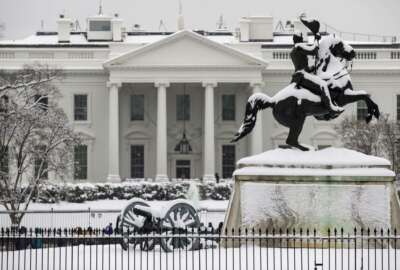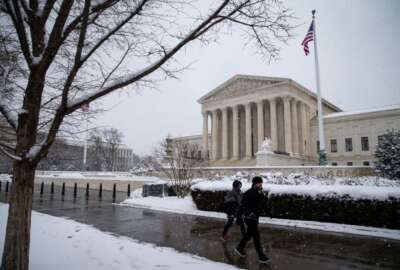
Survival Kit: White bread, milk or contraceptives?
Now that the record 35-day partial shutdown is history, at least for awhile, it is only fitting that 75 percent of the nation is enduring several days of snow, ice...
Now that the record 35-day partial shutdown is history, at least for awhile, it is only fitting that 75 percent of the nation is enduring several days of snow, ice and in some cases record-low temperatures. Feds from the Rocky Mountains to the Maine coast either were, have or are struggling to get to work, or were given paid time off which is nice after four weeks without a paycheck.
Even hardy government workers in places that normally know how to handle snow and ice got time off from their local executive boards. In the metro Washington area, with 14 percent of the total federal workforce, the Office of Personnel Management moved quickly on Tuesday to protect employees from snow, rain and record low temperatures.
The idea was to move up rush hour by two hours, letting many if not most workers get home before the single digit cold and snow arrived in force.
Most winters, federal Washington becomes the laughing stock of most of the nation above the 38th parallel. Feds in the metro area, which includes part of West Virginia, Virginia, Maryland, are natural targets because of how we handle (or not) ice and snow in a city bounded by the Potomac and Anacostia rivers. Here, you are almost always walking uphill or downhill. Transplants from Boston, Chicago, Detroit and Indianapolis delight in telling how they handled things back in the day. And how we don’t.
Yet most of us locals, native or adopted, have friends and neighbors from South Bend, Indiana; Milwaukee and Fargo, North Dakota, who’ve gotten stuck or driven off the road here. Many years ago a friend and I were walking to work and helped push a car with Massachusetts tags out of a snow-bound parking spot in Georgetown. The driver, Sen. Ted Kennedy, had done most of the digging before we pushed him up 29th Street.
The winter survival kit for the Washington area is world famous: White bread, milk and toilet paper. It flies off the shelves of supermarkets. Local TV stations do regular features on it. People in other areas with no love of Washington to begin with have a field day ridiculing how we react to ice and snow. Other than the obvious, the popularity of that trio of goods is lost in antiquity.
A couple of years back an IRS worker said that where she lives, Buffalo, N.Y., they have two seasons: winter and August. But she is three generations in and can handle it, mostly. Except that when she is in D.C. she falls apart like the rest of us. The winter survival kit in her neck of the woods, she said, is beer and family planning devices — and Buffalo has long winters.
So what’s in your regional survival kit? Let us know, we may learn something. Obviously we need all the help we can get.
Nearly Useless Factoid
By Amelia Brust
Paraguay is a bilingual nation whose official languages are Spanish and Guaraní. The latter is spoken by about 90 percent of the population (Spanish is spoken by about 87 percent), making it the only American indigenous language spoken by more non-indigenous people than indigenous.
Source: Wikipedia
Copyright © 2025 Federal News Network. All rights reserved. This website is not intended for users located within the European Economic Area.
Mike Causey is senior correspondent for Federal News Network and writes his daily Federal Report column on federal employees’ pay, benefits and retirement.
Follow @mcauseyWFED




